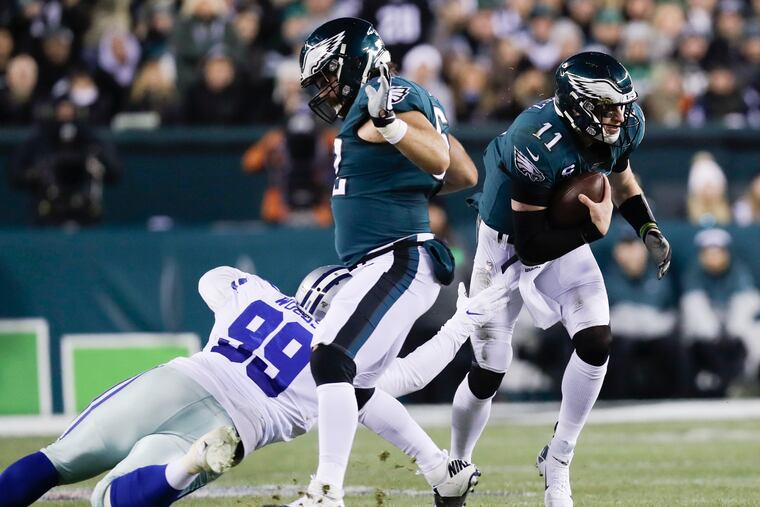Carson Wentz and Lamar Jackson embody the benefits and risks of modern quarterbacks | Mike Sielski
They can throw. They can run. And you can trace the position's evolution to a memorable Eagles game from 2010.

We’re coming up on the anniversary of the greatest game an NFL quarterback ever played. No, not Tom Brady or Joe Montana or Johnny Unitas. Not Aaron Rodgers or Doug Williams or Russell Wilson. Not Nick Foles in Super Bowl LII, or Nick Foles in his seven-touchdown game, or Nick Foles in any game that any Eagles fan looks back at through wistful eyes.
Next month, it will be 10 years since Michael Vick, in a 59-28 Eagles victory over Washington on Monday Night Football, completed 20 of his 28 passes for 333 yards and four touchdowns, carried the ball eight times for 80 yards and two more touchdowns, was sacked once for one yard, did not fumble, and did not throw an interception. Those statistics sell him short. If Vick didn’t have a perfect 158.3 passer rating in that game – and he didn’t – it didn’t mean that his performance had flaws. It meant the passer-rating formula did.
The significance of that game extends to Sunday. Vick showed, better than any quarterback in any game before him, the possibilities of the position. His game was the coal mine canary for what elite quarterbacking in the NFL would eventually look like: Wilson, Patrick Mahomes, and the two who will play at Lincoln Financial Field – the Ravens' Lamar Jackson and the Eagles' Carson Wentz.
Jackson is the reigning league MVP, having thrown 36 touchdown passes and rushed for more than 1,200 yards last year, extending over a full 16-game season a quality of play approximating what Vick delivered against Washington.
Wentz has not been at that level, obviously. But it’s no coincidence that his most dynamic season, 2017, came before a series of injuries that made the Eagles leery about having him exit the pocket too frequently, and it’s no coincidence that he has played better these last two weeks as Doug Pederson and his offensive staff have called more designed runs and rollouts for him.
» READ MORE: The secrets of Travis Fulgham’s wild and unlikely journey to the Eagles | Mike Sielski
Of course, a coach has to consider what’s on the coin’s other side, too. Even if a quarterback who can run, who thrives on the move, never suffers a career-threatening injury, the sheer wear-and-tear can shorten the period at which he’s in his prime. After 2010, Vick played just 45 games over his subsequent five seasons, and Jackson’s number of carries per game has dropped from 11.7 last season to 8.2 this year. But for now, in weighing whether to expose Wentz to more open-field hits, the Eagles apparently have allowed their pendulum to swing back toward the acceptance of such risk.
“You don’t want to put them in a box,” Pederson said. “You want them to be able to use their athleticism. That’s the gift that they have that’s gotten them to this level, the ability to use their legs, be athletic, be mobile, throw outside the pocket, do all those things. You don’t ever want to limit that.
"I think sometimes coaches try to put parameters around guys, and it can actually hurt more than it can benefit a player. In Carson’s case, in Lamar’s case, with some of these more mobile guys, use that as a strength. Use that as a weapon. Allow them to use that to extend plays in passing situations or scheme up some play-action pass or movements for the quarterback.”
There’s a reason that, after hiring Pederson in early 2016, the Eagles set their sights on trading up to draft Wentz and regarded Jared Goff, who was more of a classic drop-back passer, as the slightly lesser option.
Pederson was Donovan McNabb’s teammate. He was a quality-control assistant under Andy Reid in 2010, when a more mature Vick was finally receptive to the kind of coaching he needed to develop into an above-average passer, when these ideas for expanding what a quarterback could do and how he could do it began percolating in Reid’s mind. He was Reid’s offensive coordinator in Kansas City, where the Chiefs had a smart, mobile quarterback in Alex Smith before they had the league’s best quarterback in Mahomes.
With his recognition that college offenses were having their quarterbacks throw the ball more often out of more-creative formations, Reid has been at the forefront of this revolution.
“These quarterbacks you’re getting aren’t necessarily running the wishbone anymore,” Reid said in a 2017 interview. Pederson – just like Jackson’s coach and Reid’s longtime assistant, John Harbaugh – has followed suit. That Monday night at FedEx Field 10 years ago was a sign of things to come. Sunday is just the latest stage of the arrival.